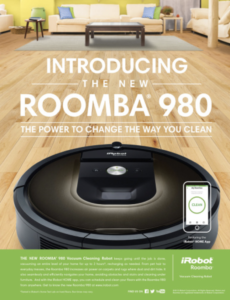New technology is made to help consumers get things done faster, better and with less work. Think back to the 1950’s, the surge in home appliances took off because it made housewives lives easier – the vacuum cleaner, the dishwasher and fancy new refrigerators just to name a few. Today is no different, new technology is out to help improve consumers lives. Voice assistant Alexa, smart refrigerators, smart thermostats, and Roombas are a few of the new devices that use the Internet of Things (IoT) to enable our lives to be easier.
The internet of Things just means that it is a computing device embedded in everyday objects that is interconnected to the internet, this helps enable it to send and receive data. For marketers, this sending and receiving data is a goldmine. As a consumer uses these objects, it stores the habits and behaviors of the consumer enabling it to do a better job and also allows the manufacturer to better understand the needs of the consumer. Ideally this seems fantastic, just like the sensors on new cars – you won’t hit the curb if it alerts you once you get close. But is this an invasion of privacy? Do you want manufacturers and advertisers knowing this information? If you buy the products, it seems there is no way of opting out of this information sharing.
In 2017, the New York Times published an article about how certain pricey models of the Roomba now map out your home, to ensure it can avoid crashing into certain items. In theory, this seems like a normal computing functionality but if this information is shared with Amazon, Apple or Google it might be an open door to a new form of surveillance. The Roomba now knows the exact size of your house and whether or not you have enough room by the front door for a table, next comes the Amazon ads for an entry table and so on. *I do want to note that Roomba will only give your data to third parties if you consent to doing so but it still has this information the moment you log onto the internet with it.
As technology progresses, there may be no avoiding this type of data sharing. As a marketer this would enable advertising to be better targeted. All these new technologies seem great in theory but sometimes I think we just need to work on the simpler technologies first – getting Siri to understand me, making sure car alarms don’t go off randomly, automatic hand towel dispensers working without me waving in front of it three times, and having a phone battery that doesn’t eventually stop holding it’s charge.
Technology is making lives easier but at what cost?
Astor, M. (2017, July 25). Your Roomba may be mapping your home, collecting data that could be shared. The New York Times. Retrieved from https://www.nytimes.com/2017/07/25/technology/roomba-irobot-data-privacy.html
Morgan, J. (2014, May 13). A Simple explanation of ‘The internet of things’. Forbes. Retrieved from https://www.forbes.com/sites/jacobmorgan/2014/05/13/simple-explanation-internet-things-that-anyone-can-understand/#2e0fcf211d09
Newman, P. (2018, July 27). IoT report: How internet of things technology is now reaching mainstream companies and consumers. The Business Insider. Retrieved from https://www.businessinsider.com/internet-of-things-report



8 Responses to Making Everyday Easier But At What Cost?